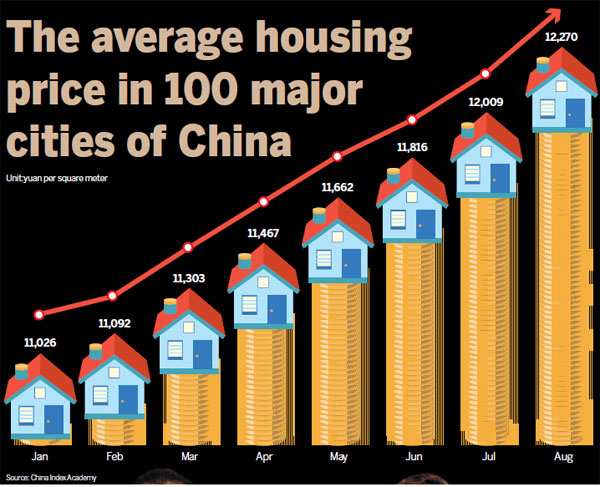Double whammy

If skyrocketing prices spooked homebuyers before, new measures offer little relief
Li Yan, a 32-year-old company executive based in Beijing, had a not-so-pleasant National Day holiday in the first week of this month.
The new housing policy, rolled out on Sept 30, shattered her dream of owning an apartment in the city's Haidian district, home to well-known educational institutions.
Li, mother of a five-year-old son, hails from Anhui province in East China. She had plans to buy a two-bedroom flat close to a good primary school in Haidian, and ask her parents to move into her current home, a one-bedroom flat in Chaoyang district. She was able to save enough money for the 30 percent down payment in late September.

But, according to the new housing policy, which was announced just ahead of the holiday, she has to make a 50 percent down payment. This, despite having paid off all mortgages on her first home, which required only a 30 percent down payment earlier.
"I know the new policy is mainly aimed at curbing speculative home purchases, but that's also bad news for homebuyers like us who need a home for children's education or for improved living standards," said Li.
From Sept 30 to Oct 6, 19 cities introduced similar measures, mostly higher down payments for a second home, but some prohibited the purchase of second and third homes.
For instance, Beijing increased the down payment for first-time homebuyers from 30 percent to 35 percent; that for second homes rose from 30 percent to a minimum 50 percent. For a second home larger than 140 square meters, the down payment is now 70 percent.
"I expect more cities will roll out similar policies, especially those satellite cities close to metropolitan cities," says Zhang Dawei, an analyst with Centaline Property.
The retrictive moves follow an extraordinary upswing in home prices this year that left many homebuyers fuming with astonishment, anxiety and anger.
Home prices rose in 64 of 70 cities tracked by the Bureau of Statistics in August, up from 51 the previous month. Shanghai home prices surged a record 4.4 percent month-on-month and 31 percent year-on-year; Beijing's levels climbed 31 percent month-on-month and 24 percent year-on-year.
When property major Vanke's Shanghai branch started an online sale of 442 new houses in mid-September, 1,760 prospective buyers bid as soon as the event started at 10 am, almost causing the server to crash. Minutes later, all the 442 units were snapped up.
The frenzy also spread to provincial capitals. The volume of transactions for apartments in Hangzhou, for instance, rose more than 180 percent week-on-week between Sept 12 and Sept 18 as investors flocked to the city to buy second homes before the new home purchase limits for non-resident buyers took effect.
Soaring home prices and rise in transactions, which mark the current property rush, have contributed to a surge in housing mortgages and a fall in construction land.
Central bank data showed that Chinese banks in August issued 529 billion yuan ($79 billion; 71.4 billion euros; 64.6 billion pounds) in household medium- and long-term loans, mortgages accounting for 55.7 percent of the total. In the first eight months of the year, these loans rose 90.4 percent year-on-year to 3.63 trillion yuan.
One difficulty in reining in the home-buying frenzy is the larger leverage residents used through commercial banks with a growing appetite for mortgage loans.
Buyers in second- and third-tier cities are able to obtain the same mortgage discounts as in the largest hubs, normally between 10 percent and 15 percent, a sign that a liquidity surge has backed up the rally, says Jeffrey Gao, a Hong Kong-based property analyst at Nomura Holdings Inc.
"The rising home prices are now based on household loans, which is risky," says Yao Zhizhong, a global economic and political researcher with the Chinese Academy of Social Sciences.
A natural, and sometimes artificial, shortage of land for housing development could be another reason for the home price hikes, particularly in big cities, experts say.
For instance, Beijing plans to supply only 4,100 hectares of construction land this year, down from 4,600 hectares in 2015 and 5,150 hectares in 2014.
Prices of recently auctioned plots in many cities were higher than those of nearby existing homes, meaning that home prices in these areas are set to increase.
An increasing number of investors are jumping on the housing bandwagon because they don't have many alternatives to maintain or increase the value of their assets, industry observers say.
China needs to quicken its economic restructuring and develop new growth engines that can generate returns higher than that of the property sector, says housing market analyst Liu Ce.
Xinhua contributed to this story
Contact the writer at huyuanyuan@chinadaily.com.cn
(China Daily Africa Weekly 10/14/2016 page30)
Today's Top News
- Foreign ministers of China, Egypt call for Gaza progress
- Shield machine achieves Yangtze tunnel milestone
- Expanding domestic demand a strategic move to sustain high-quality development
- Xi hears report from Macao SAR chief executive
- Xi hears report from HKSAR chief executive
- UN envoy calls on Japan to retract Taiwan comments






























